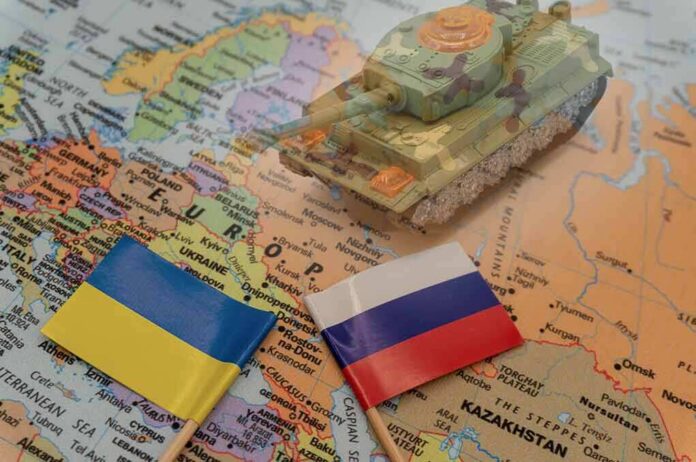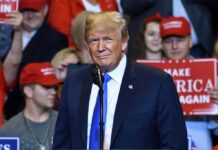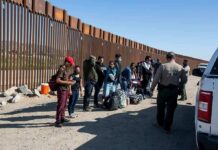
Russia’s massive aerial assault on Ukraine, the largest since the 2022 invasion with 355 drones and 9 cruise missiles, has killed at least 12 civilians as Moscow brazenly claims these attacks are justified responses to Ukrainian provocations during fragile peace negotiations.
Key Takeaways
- Russia launched its largest aerial attack since 2022, firing 355 drones and 9 cruise missiles at multiple Ukrainian regions including Kyiv, killing at least 12 people
- Moscow claims these strikes are justified responses to Ukrainian drone attacks and accuses Kyiv of deliberately sabotaging peace talks
- President Trump has criticized Putin’s actions and threatened new sanctions while diplomatic channels have reopened for the first time in three years
- Russia has rejected proposals for a 30-day unconditional ceasefire while demanding Ukraine abandon NATO ambitions and cede territory
- The two countries recently conducted their largest prisoner exchange, swapping 1,000 people each, showing some diplomatic progress despite escalating violence
Russia’s Massive Air Assault While Claiming Victimhood
Russia has launched what Ukrainian officials describe as the largest aerial assault since the full-scale invasion began in 2022. The attack involved an unprecedented barrage of 355 drones and nine cruise missiles targeting multiple regions across Ukraine, including the capital Kyiv. This coordinated strike resulted in at least 12 civilian deaths and dozens of injuries, demonstrating a significant escalation in Russia’s military campaign. Despite the overwhelming evidence of Russian aggression, Moscow continues to portray itself as responding defensively to provocations from Kyiv, a narrative that conflicts with the scale and civilian impact of these attacks.
“The last three nights were absolutely sleepless. One of the nights I spent in the metro station sheltering from the Russian ballistic missiles. The other two, I slept at home but I was regularly woken up by the explosions. They were very loud and of course it was very chilling.” said Olena Halushka.
Ukraine-Russia war: Warning over Trump’s failed peace talk plan after Putin launches largest drone strikehttps://t.co/AlsrOB9X7p
— The Independent (@Independent) May 26, 2025
Peace Talks Undermined by Mutual Accusations
Moscow has explicitly accused Ukraine of deliberately escalating hostilities to derail nascent peace negotiations. Russian defense officials claim that Kyiv, with the support of some European countries, has taken a series of provocative steps to thwart negotiations initiated by Russia. This rhetoric aims to shift blame for the continued conflict onto Ukraine while positioning Russia as the reasonable party seeking resolution. Kremlin spokesman Dmitry Peskov reinforced this narrative, stating, “At the very least, we can say that these actions by Kyiv are inconsistent with efforts towards a peace process.”
“Kyiv, with the support of some European countries, has taken a series of provocative steps to thwart negotiations initiated by Russia.” stated the Russian defence ministry.
The accusations come as diplomatic channels have reopened with direct talks between Russian and Ukrainian officials for the first time in three years. Despite this potential opening, Russia has rejected proposals for a 30-day unconditional ceasefire that could create space for meaningful dialogue. Instead, Russian officials claim their military has destroyed 2,331 Ukrainian drones between May 20 and 27 alone, a statistic they use to justify their own escalating attacks while ignoring the disproportionate scale and civilian impact of their operations in Ukraine.
Trump Administration’s Response and Diplomatic Efforts
President Trump has responded firmly to Russia’s escalation, criticizing Putin’s actions and threatening new sanctions. This stance represents a significant moment in U.S.-Russia relations under the Trump presidency, with the administration showing willingness to exert pressure on Moscow despite previous efforts to improve bilateral relations. Ukrainian officials, however, are pushing for more concrete actions beyond rhetoric. Andriy Yermak, President Zelenskyy’s chief of staff, expressed frustration with the international response, stating, “We need to end this eternal waiting — Russia needs more sanctions.”
“We would, of course, hope very much. We would very much hope that President Trump would finally see the real nature of Putin and finally start implementing his own principle — peace through strength. But this strength should be pressure over the aggressor, not pressure over the victim.” stated Olena Halushka.
Despite the escalating violence, some diplomatic progress has occurred. The two countries recently conducted their largest prisoner exchange to date, swapping 1,000 people each. Russia is reportedly preparing a document outlining its peace terms, though it has not yet been presented to Ukraine. Russian foreign ministry spokeswoman Maria Zakharova stated, “As soon as the memorandum is ready, it will be sent to Kyiv. We hope that the Ukrainian side is doing the same.” However, Russia’s demands that Ukraine abandon NATO ambitions and cede territory remain significant obstacles to meaningful peace.
Ukraine’s Skepticism and Call for International Support
Ukrainian officials and activists remain deeply skeptical of Russia’s intentions, viewing the peace talk rhetoric as a smokescreen for continued aggression. Olena Halushka, a prominent Ukrainian activist, warned against taking Russian statements at face value, saying, “I think it’s very important that our partners do not actually care or seriously treat what Russia is saying because Russians are lying. They are just inventing disinformation, they are inventing a new reality and they are trying to sell this new reality to our partners.” This skepticism is grounded in the reality of continued Russian attacks on civilian infrastructure.
Halushka emphasizes that Russia’s strategy aims to pressure Ukraine into capitulation by instilling fear and insecurity among its citizens through relentless attacks on critical infrastructure and population centers. She calls for stronger international action, including increased military aid for Ukraine and tougher sanctions on Russia. The continued Russian assault on Ukrainian cities underscores the gap between diplomatic rhetoric and the brutal reality on the ground, highlighting the challenges facing any genuine peace process while Russian aggression continues unabated.












